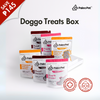As a pet owner, providing proper nutrition is essential for maintaining the health and well-being of our canine companions. Dogs, like humans, require a balanced diet to thrive. When it comes to providing optimal nutrition for your furry friend, understanding the key components that contribute to a wholesome nutritious and well-balanced dog food is paramount.
A high-quality dog food should be carefully curated with the exact blend of essential ingredients that cater to their specific dietary needs. This guide provides valuable insights into dog nutrition, including the importance of essential nutrients.
5 Key Nutrients for Dog Nutrition
Ensuring optimal health and well-being for our furry companions helps support their growth, development and overall vitality.
Below are the key nutrients to include in your dog's nutrition plan for their well-being and optimal health.
1. Proteins

Dogs need protein for muscle development and repair. Considered the building blocks of life, protein plays a vital role in a dog's diet. It aids in muscle development, supports tissue repair, and helps to maintain a healthy immune system.
High-quality animal-based proteins are excellent sources of essential amino acids for dogs such as:
- chicken
- beef
- Fish
- eggs
.
2. Carbohydrates and Fiber
While dogs are primarily carnivorous, carbohydrates serve as an important energy source for them. Complex carbohydrates and fibers contribute to sustained energy levels and aid in proper digestion.
Whole grains as well as vegetables also provide valuable fiber, vitamins, and minerals that’s best for your dog diet. These complex carbohydrates contribute to sustained energy levels and aid in proper digestion such as:
- brown rice
- Oats
- Quinoa
- sweet potatoes
- peas
3. Fats

Contrary to popular belief, fats are not entirely bad for dogs. In fact, they are crucial for their overall well-being. Fats provide a concentrated source of energy and aid in the absorption of fat-soluble vitamins. They also help maintain healthy skin and coat, promote brain function, and support the immune system. Sources of healthy fats include:
- fish oil
- canola/rapeseed
- chicken fat
- soybean oils
4. Vitamins and Minerals
Dogs require a range of essential vitamins and minerals to support various bodily functions. Ensure a balanced diet with a range of fruits, vegetables, and supplements as needed. Essential minerals such as calcium, phosphorus, and iron are vital for strong bones, teeth, and overall cellular function.
- Vitamin A is essential for vision and immune health
- Vitamin D promotes bone development and calcium absorption.
- Vitamin B aid in energy metabolism
- Vitamin E acts as an antioxidant to protect cells from damage
5. Water

Water is a crucial nutrient for dogs, necessary for proper digestion, nutrient absorption, temperature regulation, and overall hydration. Make sure your dog has access to fresh, clean water at all times.
In addition to providing clean water, you can also incorporate moisture-rich foods into your dog's diet, such as canned or wet dog food, to help increase their overall hydration. However, water should always be readily available as the primary source of hydration.
Final Words
Providing a customized, well-balanced diet for your companion helps promote their overall health and vitality. It is crucial to seek advice from a veterinarian to address any specific concerns and make informed decisions about your dog's nutrition. With proper care and attention to their dietary needs, you can contribute to your dog's well-being and enhance their quality of life.
Frequently Asked Questions (FAQs) About Dog Nutrition
What are the essential nutrients dogs need in their diet?
Dogs require a balanced diet that includes proteins, carbohydrates, fats, vitamins, and minerals to support their overall health.
How often should I feed my dog?
Feeding frequency depends on your dog's age, size, and activity level. In general, adult dogs can be fed twice a day, while puppies may require more frequent meals.
Is homemade dog food a good option?
Homemade dog food can be a viable choice, but it requires careful planning and consultation with a vet or veterinary nutritionist to ensure nutritional adequacy.
What should I do if my dog has food allergies?
If you suspect your dog has food allergies, consult with a veterinarian to identify the allergen and develop an appropriate dietary plan that avoids triggering ingredients.
Are supplements necessary for my dog's diet?
While a balanced diet usually meets a dog's nutritional needs, supplements may be recommended in certain cases. Consult with a veterinarian before introducing any supplements.


